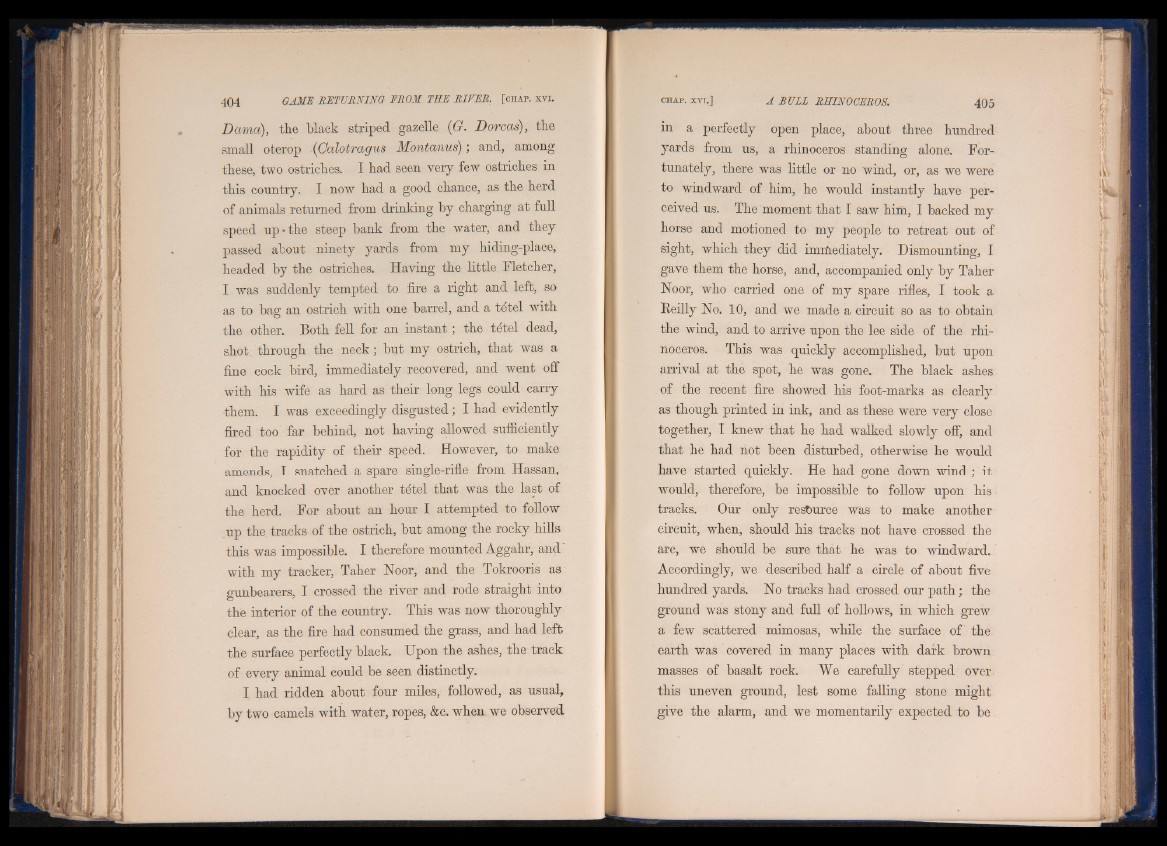
Dama), the black striped gazelle (G. Dorcas), the
small oterop (Calotragus Montanus) ; and, among
these, two ostriches. I had seen very few ostriches in
this country. I now had a good chance, as the herd
of anim als returned from drinking by charging at full
speed up «the steep bank from the water, and they
passed about ninety yards from my hiding-place,
headed by the ostriches. Having the little Fletcher,
I was suddenly tempted to fire a right and left, so
as to bag an ostrich with one barrel, and a titel with
the other. Both fell for an instant; the tetel dead,
shot through the neck; but my ostrich, that was a
fine cock bird, immediately recovered, and went off
with his wife as hard as their long legs could carry
them. I was exceedingly disgusted; I had evidently
fired too far behind, not having allowed sufficiently
for the rapidity of their speed. However, to make
amends, I snatched a spare single-rifle from Hassan,
and knocked over another tetel that was the last.of
the herd. For about an hour I attempted to follow
up the tracks of the ostrich, but among the rocky hills
this was impossible. I therefore mounted Aggahr, and'
with my tracker, Taher Noor, and the Tokrooris as
gunbearers, I crossed the river and rode straight into
the interior of the eountry. This was now thoroughly
clear, as the fire had consumed the grass, and had left
the surface perfectly black. Upon the ashes, the track
of every animal could be seen distinctly.
I had ridden about four miles, followed, as usual,
by two camels with water, ropes, &c. when we observed
in a perfectly open place, about three hundred
yards from us, a rhinoceros standing alone. Fortunately,
there was little or no wind, or, as we were
to windward of him, he would instantly have perceived
us. The moment that I saw him, I backed my
horse and motioned to my people to retreat out of
sight, which they did immediately. Dismounting, I
gave them the horse, and, accompanied only by Taher
Noor, who carried one of my spare rifles, I took a
Beilly No. 10, and we made a circuit so as to obtain
the wind, and to arrive upon the lee side of the rhinoceros.
This was quickly accomplished, but upon
arrival at the spot, he was gone. The black ashes
of the recent fire showed his foot-marks as clearly
as though printed in ink, and as these were very close
together, I knew that he had walked slowly off, and
that he had not been disturbed, otherwise he would
have started quickly. He had gone down wind ; it
would, therefore, be impossible to follow upon his
tracks. Our only resource was to make another
circuit, when, should his tracks not have crossed the
arc, we should be sure that he was to windward.
Accordingly, we described half a circle of about five
hundred yards. No tracks had crossed our path; the
ground was stony and full of hollows, in which grew
a few scattered mimosas, while the surface of the
earth was covered in many places with dark brown
masses of basalt rock. We carefully stepped over
this uneven ground, lest some falling stone might
give the alarm, and we momentarily expected to be